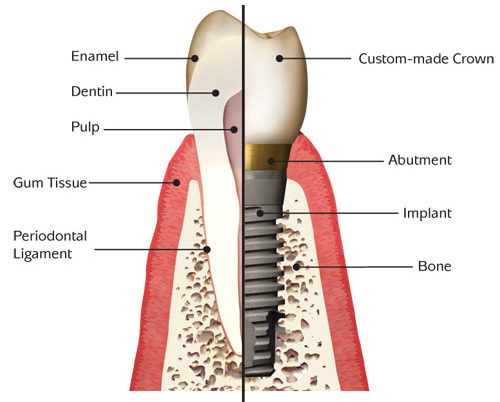Dental implants are the most advanced way to replace a missing tooth or teeth. It is a replacement root made most commonly of titanium, which is implanted into the jaw in areas where a tooth or teeth have been lost. These then acts as a root and a replacement tooth can then be fixed to it in a similar way as a crown (please see the enclosed picture). They are currently the closest you can get to natural teeth and although it is impossible to beat or replicate a healthy natural tooth it is often reported by patients that implants look, feel and function like natural teeth.
Most implants are placed under local anaesthesia similar to that used for fillings or extractions. They are inserted into the jawbone after small incisions are made in the gums. For nervous patients it is possible to arrange for conscious sedation. After a period of time the bone into which the implant is placed will attach to the surface of the implant. The time required to complete treatment also differs from patient to patient and their individual treatment plan.
There is hardly anybody who is not suitable for implant treatment. With the exception of rare intravenous medical treatment all other medical conditions, managed during implant treatment, can lead to a successful outcome.
When treatment is completed you can expect to use implant-supported teeth in a very similar way to natural teeth. It is important to understand that implant supported teeth need ongoing daily cleaning and maintenance just like normal teeth. They are fairly easy to clean and you will be shown how to do this.
Most patients are pleasantly surprised as to how little pain is experienced after implant placement. Often none or just a couple of pain control tablets are needed on the day after the procedure.
It can be accepted that a well integrated implant that is well maintained in a healthy mouth can last many years with a good possibility that this can last you your lifetime.
During treatment you will be able to wear a temporary plastic denture or removable type bridge if you require one of aesthetic or mastication reasons.
The benefits of implant treatment include reliability, comfort and conservation of the adjacent teeth. More importantly, bone support and prevention of further bone loss as well as confidence in a secure dentition and improvement in overall health as oral health improves. Possible alternatives include removable dentures and fixed bridges.



